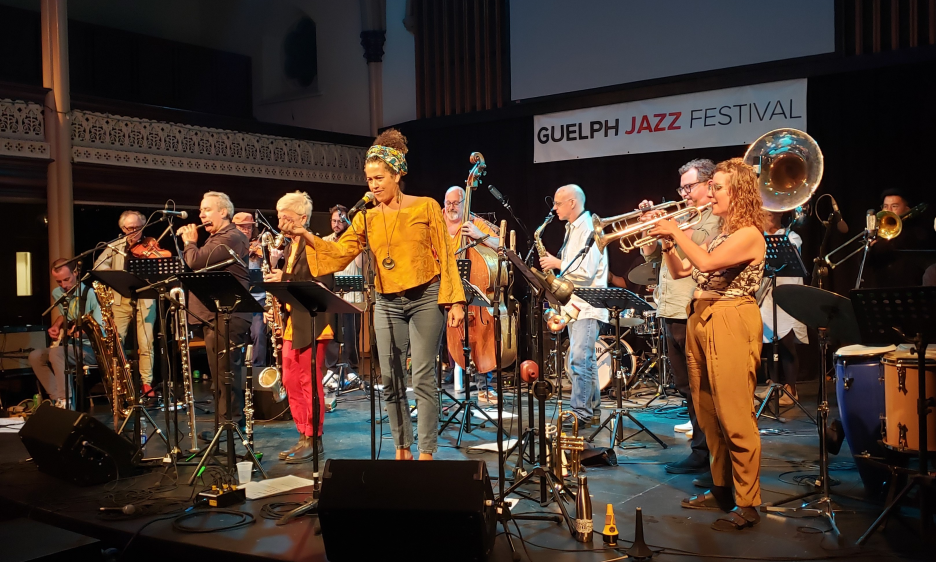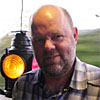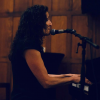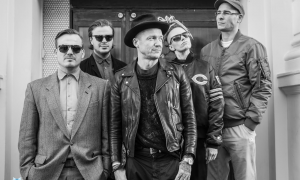Home » Jazz Articles » Live Review » Celebrating and Reflecting Back on Guelph Jazz Festival @ 30
Celebrating and Reflecting Back on Guelph Jazz Festival @ 30

Courtesy Josef Woodard
Along with the FIMAV festival in Victoriaville, Quebec, Guelph has established its place firmly in the left of center- minded niche of the global jazz festival cosmos.
Guelph Otario, Canada
September 14-17, 2023
There are precious few jazz festivals in the Americas adhering to what could be called the Triple-A curatorial mandate: adventurous, avant-garde and art-centric. These special cases cling to a commercially fragile, demographically marginal—and also culturally vital—realm and mission.
Such conditions make milestone in a left-leaning festival's life especially notable, as was the case with the Guelph Jazz Festival in its 30th anniversary edition. Although Guelph's geo-cultural purview has been more Canadian-focused in recent years, compared to its formerly more international scope, the festival—attached to colloquium based at the University of Guelph's International Institute for Critical Studies in Improvisation—continues to follow a formidable, progressive course. Along with the FIMAV festival in Victoriaville, Quebec, Guelph has established its place firmly in the left-of-center-minded niche of the global jazz festival cosmos.
As it happens, this year's Guelph festival was also notable as the swan song for director Scott Thomson, who took the reins over from founding director Ajay Heble in 2017 and was recently announced as the new head of the Victoriaville festival, taking those reins from its founder, Michel Levasseur. In other Canadian jazz world news, Thomson's final Guelph program showcased impressive musicians from shore to shore in Canada, Vancouver Island to Halifax—the latter locale represented in the form of the refreshingly understated and atmospherically-inclined "chamber jazz" balm of the Sunday morning finale, by New Hermitage.
A roughly considered top five shows for this listener, out of the program total of 12 shows, includes the Lina Allemano Four, Silvervest: Zombik & Caloia and Montreal's rightfully legendary Ratchet Orchestra (both featuring poetic dynamo vocalist Kim Zombik and hyper-versatile bassist/composer Nicolas Caloia), along with Francois Houle's moving tribute the late, highly influential Vancouver festival director Ken Pickering and the conceptualist-pianist Cory Smythe.
A rare marquee artist from the US on this year's roster, Smythe has played with Tyshawn Sorey, Anthony Braxton and mainstream classical star Hilary Hahn. But he had something unique and bold to say in solo mode, delivering a mesmerizing performance on Saturday morning. Concert source material came from his 2022 recording of his eco-minded suite "Smoke Gets in Your Eyes," deftly blurring and reformulating that timeless standard. Smythe's approach is as much rooted in new music experimentalism, with a rigorous focus, as it is linked to a discernibly jazz aesthetic of shifting dynamics and emotions.
As intriguing as the recording may be, the "canned" listening experience pales badly by comparison with the performative brilliance of the live item. Smythe has choreographed an elaborate sonic and visual scheme involving spare—but sometimes ferocious—playing of the actual piano keys, inside-the-piano percussiveness and light prepared piano touches mixed with ever-so-subtle electronics and a digital keyboard which creates a quarter-tone piano effect when he plays the actual piano keys.
Color me bewitched, and wondering if this wasn't my personal festival epiphany concert, whatever Smythe's jazz credentials.
Reflections on and historical ripples from the festival's 30-year history was a running theme this year, including the panel discussion component at the University, gazing inward, tightly focused on the heritage and reality of the festival itself. (This journalist and veteran of a handful of past festival visits, was one of the speakers on the "Jazz Writers" panel, testing my verbal skills alongside veteran Canadian jazz writer and avant-champion Stuart Broomer. Writer and academic Sara Villa was missing-in-action, laid low by COVID.)
Another point of historic departure was a double-header paying homage to the late, great Steve Lacy, whose fondly-recalled Guelph concert 20 years earlier occurred when the soprano saxophonist was gravely ill and soon thereafter passed. Houle and soprano saxophonist Jorrit Dijkstra offered a fascinating set of rarely- heard Lacy pieces for clarinet and soprano, bustling with Lacy's quirky wit and restlessly exploratory ways. The musical love continued in a set of art songs, originally written for his wife Irene Aebi, sensitively performed here by saxophonist Kayla Milmine and pianist Tania Gill, but lacking the critical song/lyrical element. Vocalist Susanna Hood was absent due to illness.
The official festival opener came in the form of the deceptively modest-scaled duo Silvervest, in fact, one of the more fascinating new projects on the Canadian jazz scene. Through a remarkable empathetic link and creative fluidity, the sensational singer-poet Zombik and nimble bassist Nicholas Caloia (nimble in terms of dexterity and ideas) have created a fascinating entity both respectful of jazz (e.g. Abbey Lincoln and Betty Carter), soul and spoken word traditions, but also palpably itching to create new expressive pathways.
Silvervest was one of many Canadian acts appearing at the 2022 edition of the major jazz expo jazzahead! in Bremen, Germany, the year that Canada was the country in focus. Another impressive artist in Bremen was Allemano—who, in fact, lives in both Toronto and Berlin. Her late-night set in Guelph's humble but hip upstairs venue artBar was one of the clear dazzlers of the festival, between the inventive, idiom-stretching structures of her compositions—slithering between jazz, free improv and classical/new music polarities---and the of rich and exploratory nature of her work as a trumpeter.
Allemano is a prolific music-maker and DIY champion, with her own label, Lumo Records, and various projects afoot, including the Lina Allemano Four (alto saxophonist Brodie West, drummer Nick Fraser and bassist Andrew Downing)—now up to its 18th year in operation and evolution. On this occasion, the band worked out, beautifully, on her latest project, a series of contrasting diptychs, along with the Prokofiev-inspired "Pipe Dream" and the dirge-like rumbling of "Hunger and Murder," from her pandemic era-inspired project called "Plague Diaries." Allemano has been around and deserves more of an international spotlight for her bracingly creative, outward- bound adventures. In other classically-tinged/tweaked news, the deliciously unconventional Josh Zubot Strings—essentially a string quartet bolstered by a double bass—is a freewheeling but also serious variation on the string ensemble tradition. Taut structural moments, free improv, and detours into areas vaguely related to a Monk-ish blues and whirlwind bluegrass from another planet energized the Royal City Mission venue.
In that cavernous space, Zubot had also appeared the night before, as part of Montreal's grand and mischievous avant-big band organism, Ratchet Orchestra. The group, which last played the Guelph festival in 2010, and this long but wholly satisfying concert adventure featured a set of diverse compositions and free-play strategies laid out by bassist Caloia and deftly taking advantage of the presence of strings along with more typical jazz big band colors. Along with the expected raucous sturm und drang und swell of the band, there were moments of languid melancholy, with echoes of Henry Threadgill. A sign of the post-pandemic times? Adding considerably to this incarnation of Ratchet was the anchoring vocal presence of Zombik, who lent a soulful-heady character up front. They've got to keep meeting up with her like this.
Off in its own hard-to-pigeonhole corner of the avant-jazz domain, the Thursday night spotlight went to the group known as {Ahmed}. Named in honor of legendary bassist Ahmed Abdul-Malik (who played with Thelonious Monk and others), the band finds a new chemistry from well-defined ensemble parts. Over the course of an unbroken hour—long set, bassist Joel Grip opened and closed with solo sections, framing the restlessly tumbling drum energy of Antonin Gerbal, well-placed stabs and smears from Pat Thomas' piano and the almost anti-virtuosic presence of alto saxophonist Seymour Wright, who mostly clung to a handful of notes, played with an aggressive minimalist style and variations of tone, vaguely reminiscent of late rogue minimalist Julius Eastman's approach to music-making, but from a jazz outpost.
One of the peripheral but critical components of the Guelph Jazz Festival, like many right-minded fests, is the inclusion of a free outdoor outpost for the community— including those who wouldn't necessarily cotton to the challenging ticketed concerts—to congregate and enjoy free music in the city's central Market Square. On Friday night, the fare was about acoustic acts in the African, brass band and samba variety, while Saturday afternoon-to-midnight programming was more on a diverse curatorial plan, culminating in the Toronto-based Polaris Prize winner Witch Prophet. Director Thomson took the stage at midnight after her dynamic set and commented that this was "the first jazz festival i have programmed to feature a mosh pit."
Many fest-goers had departed by Sunday, but they sadly missed a special performance by the impressive and impressionistic Halifax-ian New Hermitage in the intimate Guelph Youth Centre venue. The inspired blend and interactive ears of Andrew MacKelvie on woodwinds, cellist India Gailey and harpist Ellen Gibling (guitarist Ross Burns was MIA) created a contemplative canvas of "chamber improvisation" sound, generally roots in a certain key but sliding in and around it. As festival closers go, this one was decidedly a grace note ending.
Tags
Festivals Talking
The Ratchet Orchestra
Josef Woodard
Scott Thomson
Ajay Heble
Michel Levasseur
New Hermitage
Ratchet Orchestra
Kim Zombik
Nicholas Caloia
Tyshawn Sorey
anthony braxton
Hilary Hahn
Steve Lacy
Jorrit Dijkstra
Irene Abei
Kayla Milmine
Tania Gill
Susanna Hood
Abbey Lincoln
Betty Carter
Brodie West
Nick Fraser
Andrew Downing
Josh Zubot Strings
Henry Threadgill
{ahmed
Ahmed Abdul-Malik
Antonin Gerbal
Pat Thomas
Seymour Wright
Julius Eastman
Witch Prophet
Andrew MacKelvie
India Gailey
Ellen Gibling
Ross Burns
PREVIOUS / NEXT
Support All About Jazz
 All About Jazz has been a pillar of jazz since 1995, championing it as an art form and, more importantly, supporting the musicians who make it. Our enduring commitment has made "AAJ" one of the most culturally important websites of its kind, read by hundreds of thousands of fans, musicians and industry figures every month.
All About Jazz has been a pillar of jazz since 1995, championing it as an art form and, more importantly, supporting the musicians who make it. Our enduring commitment has made "AAJ" one of the most culturally important websites of its kind, read by hundreds of thousands of fans, musicians and industry figures every month.
Go Ad Free!
To maintain our platform while developing new means to foster jazz discovery and connectivity, we need your help. You can become a sustaining member for as little as $20 and in return, we'll immediately hide those pesky ads plus provide access to future articles for a full year. This winning combination vastly improves your AAJ experience and allow us to vigorously build on the pioneering work we first started in 1995. So enjoy an ad-free AAJ experience and help us remain a positive beacon for jazz by making a donation today.Near
Toronto Concerts
Mar
1
Sun
Mar
4
Wed
Mar
5
Thu




























